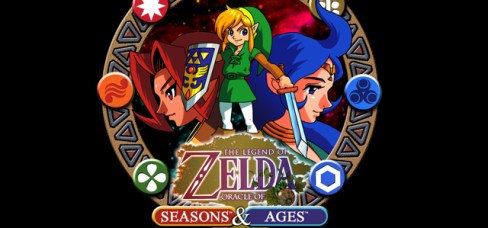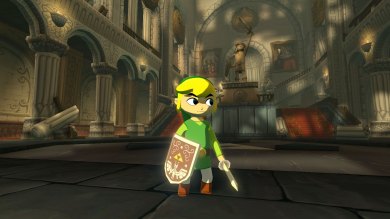7) The Legend of Zelda
Link’s very first adventure offered something to the franchise that I haven’t seen since, barring the draw behind A Link Between Worlds. Dungeons in this Hyrule could be explored at the player’s leisure. There wasn’t much in terms of story, but the game made up for its pratfalls (limited only because the hardware itself was limited) in terms of exploration. There’s no hand-holding to be had, no easy mode, no fairies in bottles to act as crutches. Everything you accomplish in the original Legend of Zelda is a testament to your true abilities, especially if you beat the entire game on your own in the past (before GameFAQs and YouTube, anyway).
At first, I thought I put the game this high on the list because of nostalgia. But replaying the game recently on 3DS thanks to the Ambassador Program (this was before save states/Restore Points were implemented into the NES games on the Virtual Console) showed me how much the NES classic has aged gracefully. It made me yearn for another Zelda where dungeons could be explored in any order the player desired. There was very little linearity. The thought of A Link Between Worlds recapturing this premise makes me very excited; I can’t wait to see what comes next.
6) The Legend of Zelda: Oracle of Ages / Seasons
The two Oracle games share something in common with Majora’s Mask, I think. They use the engine of the game that came before them (Link’s Awakening) and, despite offering something new and fresh, remain grounded in what they accomplish in terms of gameplay. I don’t need to elaborate much thanks to Phil’s review of the games, but I will say this: the two worlds to explore in Seasons & Ages are not to be missed, and (together) represent some of the franchise’s key elements that surpass those present in The Minish Cap as well as other games farther down my list.
The two Oracle games are certainly more linear than the original Legend of Zelda, but being able to explore the world by going back and forth through time, or by changing the seasons, offered something unique to each game. One’s brief visit to these two worlds (which can be completed in either order, although I honestly suggest completing Ages first for a more cohesive plot overall) meant taking advantage of each world’s unique attributes and characters. But since there’s such a strong emphasis on linking the two games together, Ages & Seasons build off one another. Your actions in one game influence the other. Cool stuff, right? And can we talk about how much the Ring System in those games was ahead of its time? …You don’t want to hear it…? All right.
5) The Legend of Zelda: The Wind Waker
I initially placed this game much lower on my list. Despite offering some of the best level design of the entire franchise, a Link who showed real emotion due to the game’s more whimsical appearance, and so many other amazing attributes—I absolutely loathed exploring things by boat. It held back The Wind Waker in ways I can’t even begin to elaborate upon, made one of Link’s finest adventures something completely cumbersome, a chore. But…then I bought a Wii U and played The Wind Waker HD.
That speedy new sail—it does wonders. The new take on the Triforce quest makes something tedious into something much more streamlined. Because I wasn’t so frustrated with the King of Red Lions, I was able to enjoy The Wind Waker unlike ever before. I’m sure all these points and more are greatly expanded upon in our review of The Wind Waker HD, but…suffice to say, the new gameplay features drastically improved this one for me. The story was already fantastic. The combat, soundtrack and other elements represented something truly unique that didn’t try to copy any other games in the franchise. If you’ve not yet given The Wind Waker (HD) a chance because you’re turned away by its more child-like appearance, please do. There’s no better time (or version) to do so, really.
Have many of you begun to predict the games that take up the remaining four spots? Read on to see if you’re right!







